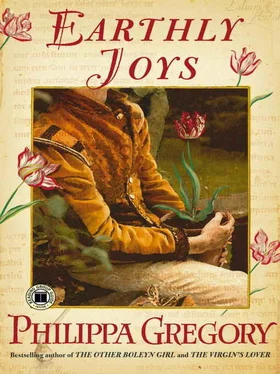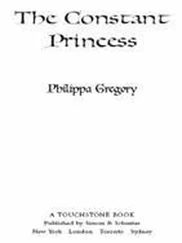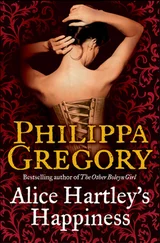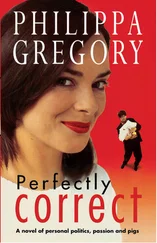“I made some sketches of the fruit trees in bud and those little daffodils beneath them,” she said. “I’ve never seen an orchard so pretty.”
“I should like to see your sketches,” John said.
“The grass is like a tapestry or a painting,” she remarked. “The true flowery mead. You can hardly see the green for flowers.”
“Now that’s just what I intended,” John said, his enthusiasm growing. “It has to be balanced all the time, and mown at the right time so that you don’t cut the flowers before they are seeded, and you have to pull the plants which are running away and drowning the rest… but I am so glad you saw it. It is supposed to look artless, and that is the hardest thing to get right!”
“So now I have a drawing based on a garden, which is based on a tapestry, which will have been based on a drawing.”
“And perhaps at the very back of it all, there was a garden.”
She looked at him with quick comprehension in her dark eyes. “The first garden? Of Eden? Do you see that as a flowery mead? I have always thought of it as a French garden, with beautiful walks.”
“Certainly there must have been an orchard.” John had an enjoyable sense of intellectual freedom, being allowed to speculate about the Bible, which, at home, had to be accepted as a revealed truth and read with uncritical devotion. “There must have been at least two apple trees.”
“Two?”
“To pollinate. Otherwise the Devil himself would have had no fruit for tempting poor Adam!”
“But I thought the scholars were now saying that Adam did not eat an apple but an apricot.”
“Really?” John had an alarming sense of the world shifting beyond the limits of his lighthearted skepticism. “But it says apple in the Bible.”
“Our Bible in English is translated from the Greek, which was translated from the Hebrew. There are bound to be errors in the translations.”
“My son would say-” He broke off. He was no longer sure what J would say. “A man of faith would say that there cannot be errors. That since it is the revealed word of God it must be perfect.”
She nodded as if it did not matter very much. “A man of faith would have to have faith,” she said simply. “But a man who questions would be bound to question.”
John looked at her doubtfully. “And are you a woman who questions?”
She smiled at him, a sudden smile illuminating her face and making her suddenly a pretty young woman. “I have a brain in my head to think for myself – but no elevated principles.”
Her uncle was shocked. “Hester!” He turned to John. “Indeed, she does herself an injustice. She is a very principled young woman.”
“I don’t doubt it…”
Hester shook her head. “I am completely respectable, which is what my uncle means; but I am talking about convictions and political principles.”
“You sound as if you are a doubter,” John commented.
“I think for myself but I never neglect the conventions,” she explained. “This is a hard world for all of us, and especially for women. My study has been to avoid giving offense and to advance my own career.”
“As a painter?” John asked.
She gave him her open, honest smile. “As a painter and a maid for now. But I shall want to marry well and care for my family and further my husband’s prosperity.”
John, accustomed to Jane’s high morality, was torn between shock at her frankness and a sense of freedom at her honesty. “Nothing more than that?”
She shrugged. “I don’t think there is anything more than that.”
“And she can certainly draw.” Her uncle moved the conversation into safer areas. “I thought I would use her sketches of your flowery mead as a background in some of the pictures for the queen’s walls.”
The young woman flushed with pleasure. “I will block them out for you,” she promised.
“Can you draw and color tulips?” John asked. “There are some in the queen’s apartment which are just coming into flower and I should like to have a picture to show my son. He chose them, bought them and planted them. He will want to know how they have done. We have had our disappointments with tulips-”
“Money?” she guessed acutely. “Were you caught in the tulip crash?”
John nodded. “But I should like him to know that they are still beautiful, even if they are not profitable.”
“I would be pleased to try,” she said. “I have not had the chance of seeing many tulips in flower. I know the Dutch tulip paintings, of course.”
“Come to my house this evening,” John suggested. “I live adjoining the silkworm house. I’ll bring a little bowl of them.”
Hester did not curtsey as she left them but dipped her head, like a boy, and went away. Her stride was like a boy’s as well, firm and matter-of-fact.
“It is all right that she comes?” John asked, suddenly remembering his manners. “I had thought I was speaking to a young draftsman. I forgot she was a young woman.”
“If she were a boy I would have had her as my apprentice,” her uncle said, watching her go. “She can come to your house, Mr. Tradescant, but I have to guard her around the court. It is a nuisance. Some of these gentlemen write sonnets to the queen all day and then go wenching like lechers at night.”
“I have a lass like her at home,” John said, thinking of Frances and her desire to be gardener to the king. “She’s been told that she will have to marry a gardener, that is the closest she can get to the work; but she wants to be one herself.”
“What does her mother say?”
“She has none now. Plague.”
The man nodded in sympathy. “It’s hard for a maid to grow up without a mother. Who cares for her?”
“We have a cook who has been with us for many years,” John said. “And housemaids. But when my son comes home from Virginia he will have to remarry. There’s my grandson as well. They cannot be left in the care of servants.”
De Critz slid a thoughtful sideways glance at him. “Hester has a good dowry,” he said casually. “Her parents left her with two hundred pounds.”
“Oh,” said John, thinking of that straightforward nod of the head and the confident walk. “Did they, indeed?”
Hester Pooks sat at the table in John’s little sitting room and drew the queen’s bowl of tulips, squinting against the candlelight and the last rays of the evening sunshine.
“I’ve seen the tulip books,” she said. “My uncle borrowed one to copy once. They show the bulb, don’t they? And the roots?”
“You can’t show these bulbs,” John said hastily. “They must be left undisturbed. Please God they are spawning underneath the soil and I will soon have two or three tulips everywhere I once had one.”
“And what do you do with the extra tulips?” she asked, never taking her eyes from the flower except to look down at her page. John watched her; he liked her direct, searching gaze.
“Some I replant in new pots here and keep them for the king and queen next year, and some I take home and plant in my own garden and keep them as stock for my nursery.”
“So who owns them?” she persisted.
“The king and queen own the parent plants,” John said. “For they commissioned my son to buy them, and paid for them. And the little bulblets we share. My son and I take half and the king and queen take half.”
She nodded. “You double your stock every year? That’s a good business,” she observed.
John thought that she was surprisingly astute for the niece of an artist. “But it does not show the profits anymore,” he said ruefully. “The market smashed in February. The best of the tulip bulbs were going for prices that would buy you a house. Passed from trader to trader as a paper bond, getting more expensive each time.”
Читать дальше
Конец ознакомительного отрывка
Купить книгу












